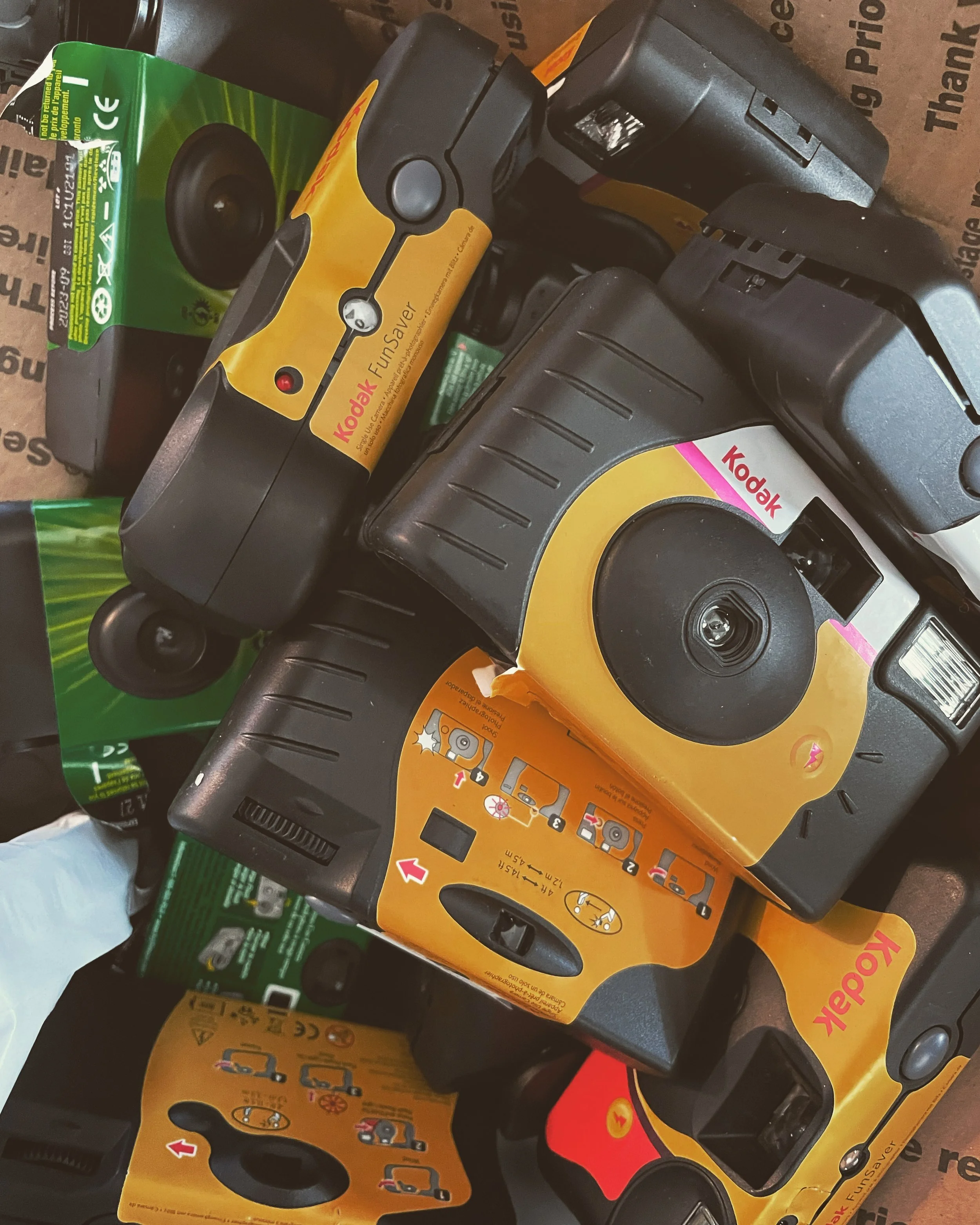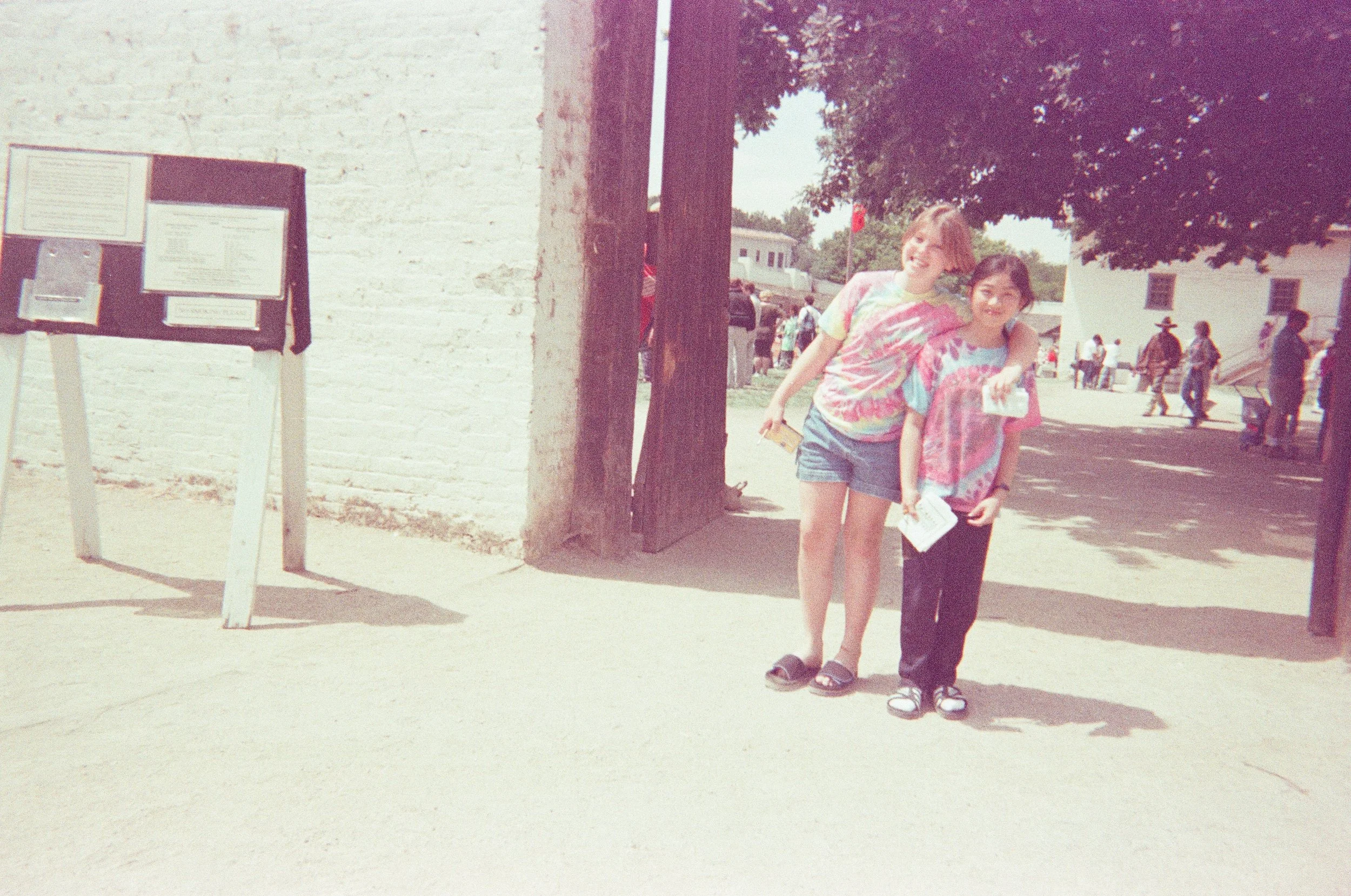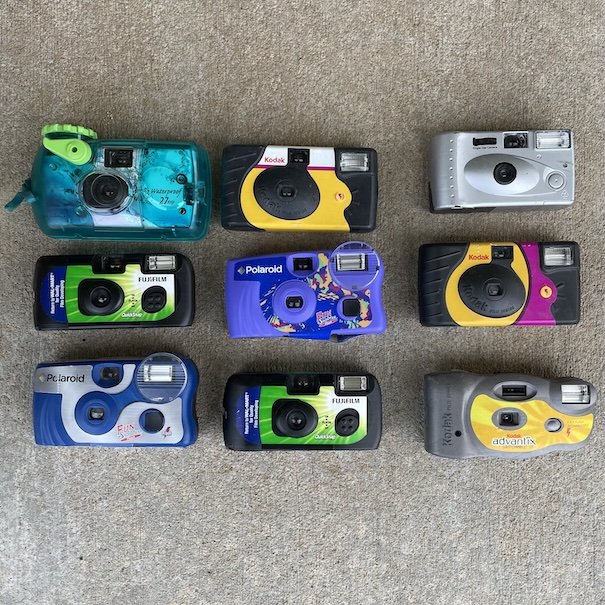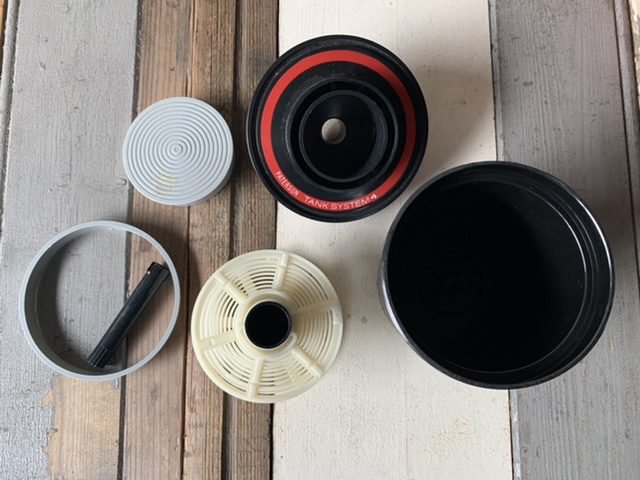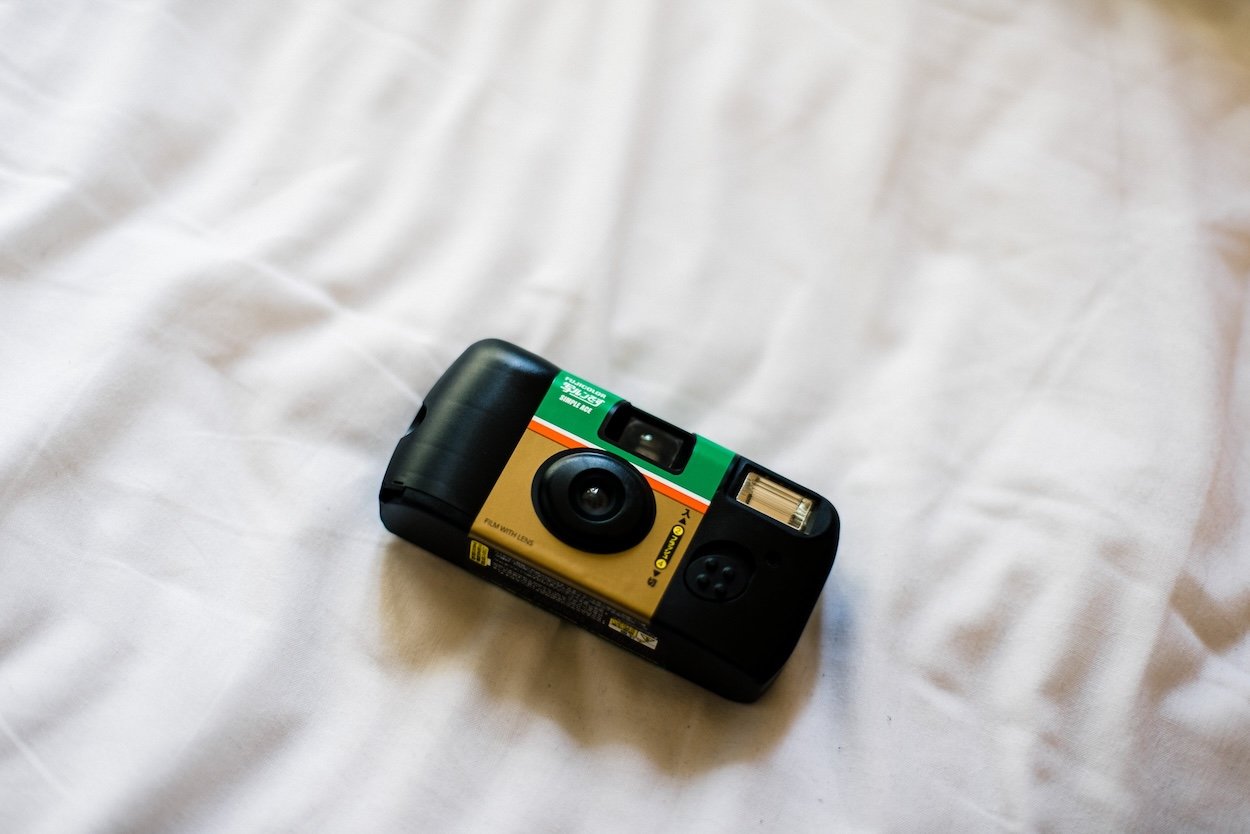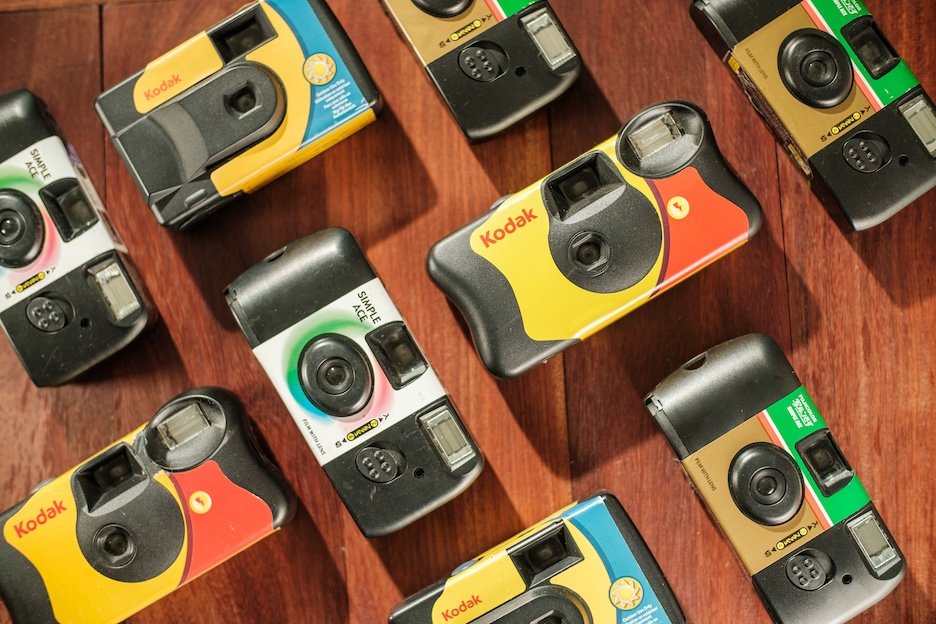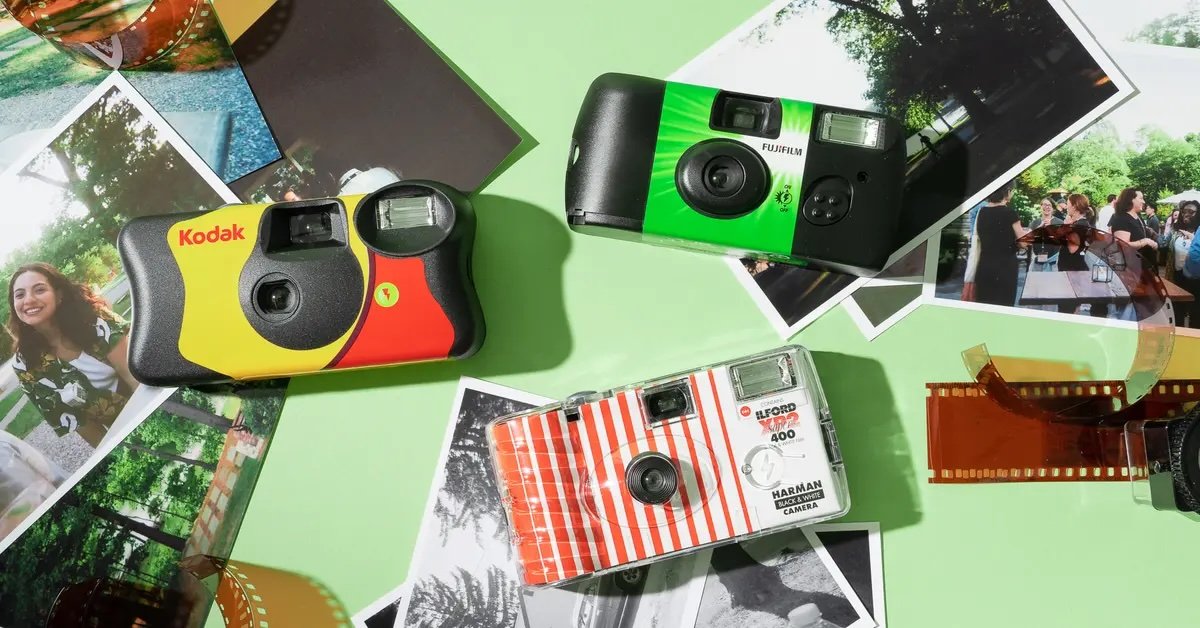Where Can I Go to Develop my Disposable Camera?
There are actually a lot of options out there for developing disposable cameras. This blog post takes a look at those options and gives you an idea of what to look for when its time to develop your disposable cameras.
Finding a lab to develop your disposable camera can be stressful! Back before I was really into photography and way before I owned my own photo lab, I can remember worrying about just dropping my disposable camera from my latest adventures as a teen living in the 90’s in an envelope and leaving it with some 16 year old at the Walmart or CVS to develop. There’s a lot of stress and anxiety associated with trusting your memories to someone who doesn’t necessarily look like they care about their job.
But it doesn’t have to that stressful! There are a lot of labs and options out there that are professional and have great customer service! You just need to find the option that works best for you. That’s what this blog post is all about, giving you an idea of what options exist for getting your disposable camera / single use camera / throwaway camera developed!
The good news is that developing disposable cameras is a straightforward process, as they contain standard film that can be processed by most film-developing services. When choosing a service, consider factors such as cost, scan quality, print options, and whether negatives are returned.
Online Film Developing Services
Online mail-in services offer convenience and often provide higher-quality scans and prints. Here are some reputable options:
Shutter Junkies Photo Lab: Specializing in disposable cameras, Shutter Junkies offers processing and higher-resolution scans starting at $12. Prints can be ordered separately, and negatives are returned.
The Darkroom: A large online film lab with services starting at $16. They provide various scan sizes and return negatives.
Local Retailers Offering Film Development
Several national retailers provide film developing services for disposable cameras:
CVS Photo: Drop off your disposable camera at any CVS location; prints are typically ready in 7-10 days.
Walgreens Photo: Offers film roll processing with options for prints from disposable cameras.
Walmart Photo: Provides processing for disposable cameras, with prints available for pickup in approximately 6 days.
Considerations When Choosing a Service
Price: Compare costs, including any additional fees for scans or prints.
Scan Quality: Higher-resolution scans are preferable for printing and archiving.
Print Options: Determine if prints are included or if they can be ordered separately.
Negatives: Check if the service returns your negatives for future use.
By evaluating these factors, you can select a film-developing service that best fits your needs, ensuring your disposable camera photos are processed to your satisfaction.
Of course, we’d love to develop your disposable camera for you! You can always head over to our Film Developing Page to find out more. Or send us an email at info@shutterjunkies.org if you have any questions! Even if you don’t choose to send your cameras in to us for processing, we’d be happy to help you find the right lab for you!
Can You Develop 20 Year Old Disposable Cameras?
You can still develop old disposable cameras, but the results won’t be as good as a new disposable. Find out the process and what to expect.
Many of us have been rummaging through old drawers or boxes and come across an old roll of film or disposable camera. Sometimes it’s hard to remember exactly how old the camera is or what we took the pictures of. Curiosity usually gets the better of us as you almost always think “Can I still develop a 20 year old disposable camera?”
Yes, You Can Develop Old Disposable Cameras
Disposable cameras do expire, but unlike the milk in your fridge, it doesn’t mean that they '“go bad” and have to be disposed of. You can find the expiration date usually by looking at the bottom or the back of your disposable camera. Most disposable cameras expire within 2 to 3 years of the manufacture date. What an expiration date really translates to is “In order to get the best possible images out of your camera, please shoot and develop your camera by this date.” You can still shoot and develop cameras of any age, but you will begin to see degredation/decay as a result of aging.
What Do the pictures from a 20 year old disposable camera look like?
We develop hundreds of old disposable cameras each and every month. There are a few very common issues that you will see with older film. With 10 to 20 year old disposable cameras, you can expect:
Image and color fading
reduced contrast (flatter image)
Shift in colors, usually towards warmer or redder tones
increased graininess
Severe fading in underexposed images
When cameras are exposed to heat or have had their internal batteries rupture, we see film burning at the top and bottom of the frame and some erosions of the emulsion. If stored improperly it is also possible to have mold/fungus growth on the film as well.
Example Images from 20 year old Disposable Cameras
Can you save the images from an old disposable camera?
Your photo lab will need to be ready and willing to do the work to recover and restore your images. Many times they are too busy to spend the necessary time to edit and restore images to a viewable state. Check with your lab before mailing in your cameras.
At Shutter Junkies, we specialize in developing disposable cameras and work with many 15 to 30 year old disposable cameras. If you’re looking for a photo lab that will take the time to work on your images, you’ve found the right place! Click the button below to check out our pricing on developing disposable cameras or email us at info@shutterjunkies.org.
Disposable Camera Developing - What you Need to Know
Once your finished taking pictures, where can you get your disposable camera developed?
Developing disposable cameras is a straightforward process, with several options available to suit your needs. Here's a comprehensive guide to help you choose the best method for developing your disposable camera film.
There are a lot of options out there and if you’re new to disposable cameras of film photography, finding a photo lab the works for you might be overwhelming. Here’s a look at all of your options for getting your disposable camera developed!
Local Drugstores and Retail Chains
Many local drugstores and retail chains offer film developing services for disposable cameras. Popular chains like CVS, Walgreens, and Walmart provide convenient options, often returning your developed photos within a few weeks. These services typically include physical prints and a CD with digital scans.
Pros:
Convenient; widespread locations.
Cons:
Quality can vary; most only offer low-quality scans.
Not all branches offer film services; film is often shipped to third-party labs.
Poor customer service and lack of personalized attention.
Most do not return your film negatives.
Developing Costs:
Walmart: Charges by the number of exposures. For example, 27 exposures with prints cost $10.96, and 36 exposures with prints cost $13.96. Find out more at Walmart
CVS: Also charges by the number of exposures. For instance, 27 exposures with prints cost $15.86, and 39 exposures with prints cost $18.82. Find out more at cvs.com
Walgreens: Offers film processing for 24 exposures with prints at $15.99. Find out more at Walgreens Photo
CVS Disposable Camera Developing
As an experiment, we took a test disposable camera over to CVS to get it developed. We didn’t have a great experience to start and it just got worse after that. We had to work hard to find someone to come and help us at the photodesk. After 20 minutes of waiting a manger finally came over to help us. We got the camera sent off and were unfortunately forced to wait for 8 weeks to get our images back. The cost was around $16 and we did get prints but there was no option at all to get our negatives back. When we inquired we were told that the negatives were destroyed immediately after they are scanned and printed. So no chance for you to save and archive your images at all. Our prints turned out good and our digital files were ok, but the scan size was small compared to what most labs offer. Over all, it just wasn’t a good experience and while the price was ok, the service was slow, customer service was non-existent, and not even having the option to get our negatives back means we won’t be getting anything developed at CVS ever again.
All of these retailers, not just CVS Photo, often do not develop film on-site, leading to longer processing times. The mass-production approach may result in less personalized service, and there's a risk of negatives not being returned. Due to these factors, many photography enthusiasts prefer alternative options.
Specialty Photo Shops
For higher quality and more personalized service, specialty photo shops are an excellent choice. These establishments handle film with care and provide superior prints and scans. The staff's expertise in various film types and processing techniques can enhance the outcome of your photos.
Pros:
High-quality prints and scans; expert handling.
Cons:
May be more expensive; fewer locations.
If you reside in a larger city, you may have access to such stores. Pricing varies by shop, so it's advisable to contact local photo shops for specific information.
Mail-In Film Developing Services
Mail-in services offer a convenient alternative, especially if local options are limited. Companies like The Darkroom, Mpix, and Process One specialize in developing disposable cameras. The process involves mailing your camera to the service provider, who then develops the film and returns your prints and scans.
Pros:
High-quality results; convenient for those without local options.
Cons:
Longer turnaround time due to shipping; potential for higher costs.
Developing Costs:
Shutter Junkies Photo Lab: Shutter Junkies Photo are the disposable camera developing experts! Developing starts at just $12. Go to ShutterJunkies.com to get your disposable developed!
The Darkroom: Offers developing services starting at $16, with options for prints and digital scans. Find out more at thedarkroom.com.
Mpix: Develops disposable cameras and uploads images to a secure online album within 1-2 days after receiving your film by mail. Find out more at Mpix.
Process One: Develops all types of disposable cameras, including Kodak Funsavers and Fuji QuickSnaps. Find out more at Process One.
Many of these labs have been in business for years and develop all types of film. Prices and policies can change so check to find out if they return your negatives, what their turn-around time is, and compare pricing with the results you get.
DIY Development
For the photography enthusiast, developing your own film can be a fulfilling project. While this requires more effort and the purchase of specific chemicals and equipment, it allows complete control over the development process. Resources and kits are available online to help beginners.
Pros: Full control over the development process; rewarding.
Cons: Time-consuming; initial setup cost, cost of maintaining/replacing chemistry.
Choosing the Right Service
When deciding where to develop your disposable camera, consider the following factors:
Quality vs. Convenience: Determine whether you prefer the convenience of a local store or the quality of a specialty shop.
Budget: Prices can vary significantly between different services.
Turnaround Time: Some options might be quicker than others, especially if you need your photos soon.
Conclusion
When deciding where to develop your disposable camera, consider factors such as convenience, quality, cost, and whether you want your negatives returned. Local drugstores and retail chains offer convenience but may compromise on quality and personalization. Specialty photo shops provide superior quality and service but may come at a higher price and be less accessible. Mail-in services strike a balance between convenience and quality, making them a viable option for many.
By evaluating these options, you can choose the best method to develop your disposable camera film, ensuring your memories are preserved as you envision.
Disposable Camera Developing FAQ
Does Walmart Develop Disposable Cameras? - Yes
Does CVS Develop Disposable Cameras? - Yes
Does Walgreens Develop Disposable Cameras? - Yes
Does Target Develop Disposable Cameras? - No
Does BestBuy Develop Disposable Cameras? - No
Does Costco Develop Disposable Cameras? - No
How much does it cost to develop a disposable camera? - Between $10 and $24
Can I get digital pictures from my disposable camera? - Yes
Disposable Cameras vs. Digital Photography: Pros and Cons
Disposable Cameras vs. Digital Photography: Pros and Cons
In the digital age, the concept of capturing moments has evolved dramatically. Yet, amidst the surge of smartphones and high-tech cameras, disposable cameras have made a surprising comeback, offering a nostalgic and unique way to document life's moments. This post delves into the fascinating world of disposable cameras versus digital photography, exploring the pros and cons of each to help you decide which suits your photographic journey best.
Disposable Cameras: The Comeback Kid
Pros:
Simplicity and Ease of Use: Disposable cameras offer a straightforward approach to photography. With no settings to adjust apart from the flash, they're incredibly user-friendly, making them perfect for all ages and skill levels.
Unique Aesthetic: The film in disposable cameras produces photos with a distinct look and feel—warm tones, natural grain, and soft focus—that digital cameras can't quite replicate. This aesthetic is highly sought after in an era where authenticity in imagery is cherished.
Surprise and Anticipation: Part of the disposable camera's charm lies in the wait and surprise of seeing your photos for the first time after development. It brings back the excitement and anticipation that digital photography often lacks.
Durability and Portability: Their compact, lightweight design and lack of reliance on batteries or charging make disposable cameras excellent companions for adventures where you wouldn't risk an expensive digital camera.
Cons:
Cost Over Time: While the initial purchase might seem affordable, the costs of developing film can add up, especially if you're an avid photographer.
Limited Exposures: Disposable cameras come with a fixed number of shots (usually between 24 to 36), limiting how many moments you can capture before needing a new one.
Environmental Impact: The single-use nature of disposable cameras raises concerns about waste and environmental sustainability.
Inconsistent Results: Depending on various factors like lighting and the camera's limited dynamic range, the quality of photos can be hit or miss.
Digital Photography: The Modern Marvel
Pros:
Versatility and Control: Digital cameras offer a range of settings to adjust for any lighting condition, ensuring high-quality images in various environments.
Instant Gratification: The ability to instantly review photos allows for immediate do-overs if a shot doesn't turn out as expected, reducing the chances of missed moments.
Cost-Effectiveness Over Time: Despite the higher initial investment, digital cameras can be more economical in the long run without the recurring costs of film and development.
Eco-Friendliness: Digital photos don't require physical materials for development, making them a more environmentally friendly option compared to film.
Cons:
Overwhelming Complexity: The multitude of settings and options available on digital cameras can be daunting for beginners, detracting from the spontaneity of capturing moments.
Constant Upgrades: The fast pace of technological advancements in digital photography can make equipment quickly feel outdated, pressuring users to upgrade frequently.
Less Tangible: The ease of taking hundreds or thousands of photos can lead to digital clutter, where images are stored and forgotten on hard drives rather than being printed and appreciated.
Finding Your Focus
Choosing between disposable and digital photography boils down to personal preference and the experience you're seeking. If you're drawn to the simplicity, unique aesthetic, and excitement of film, disposable cameras might be your perfect match. On the other hand, if you prioritize versatility, control, and the ability to experiment with settings without worrying about film costs, digital photography will suit you well.
Regardless of your choice, both mediums offer unique ways to capture and celebrate moments. Whether you lean towards the nostalgic charm of disposables or the cutting-edge precision of digital, the most important thing is to keep exploring the world through your lens, capturing memories that resonate with you.
How to Develop Disposable Camera Photos: A Step-by-Step Guide
How to Develop Disposable Camera Photos: A Step-by-Step Guide
In the age of instant digital images, the unique charm of film photography is making a notable resurgence. Disposable cameras, with their simplicity and ability to capture raw, unfiltered moments, play a significant role in this analog revival. However, once you've clicked your way through a roll of film, you're faced with the exciting yet sometimes daunting task of developing your photos. This guide will walk you through the process of developing disposable camera photos, ensuring your memories are preserved in the most beautiful way possible.
Step 1: Finish Your Roll
Before you think about developing, make sure you've used all the exposures on your camera. Most disposable cameras come with around 27 to 39 exposures. It's essential to maximize each roll, as developing costs the same regardless of how many pictures you've taken.
Step 2: Choose Your Developing Service
When it comes to developing your film, you have a few options:
Local Drugstores and Photo Labs
Many local drugstores and photo labs offer film developing services. This is a convenient option if you live near one. They typically send out the film to a central lab, which means it might take a week or two to get your photos back. Prices can vary, so it's worth checking a few places for the best deal.
Specialty Film Labs
For those seeking higher-quality scans and more personalized service, specialty film labs are the way to go. These labs often provide detailed scanning options, including high-resolution scans and color correction. They cater to film enthusiasts and professionals, ensuring your disposable camera's film gets the attention it deserves.
Mail-In Services
Mail-in services are a fantastic option if you don't have local developing options or prefer the convenience of not leaving home. You mail your disposable camera to the lab, and they send back your developed photos and negatives. Some services even offer digital downloads so you can access your photos online.
Step 3: Understand the Costs
Developing costs can vary based on where you go and the services you choose. Basic developing and printing might start around $10 to $15 per roll, with additional costs for CD or digital downloads. Higher-resolution scans and faster turnaround times can increase the price. Always check what’s included in the price, such as negatives return or extra prints.
Step 4: Prepare Your Camera for Drop-off or Mail
If you're using a local service, simply take your disposable camera as is. For mail-in services, securely package your camera in bubble wrap or a padded envelope. Ensure you fill out any required forms and include your contact information and preferences for prints or digital copies.
Step 5: Review and Share Your Photos
Once you receive your developed photos, take the time to go through them. The anticipation and surprise of seeing your images for the first time is a unique joy of film photography. Consider creating physical albums or sharing your photos online with friends and family.
Additional Tips for Developing Disposable Camera Photos
Check Reviews: Before choosing a developing service, look for reviews or ask for recommendations from fellow photography enthusiasts.
Bulk Deals: If you have multiple rolls to develop, ask if there are any discounts for bulk orders.
Preserve Your Negatives: Always ask for your negatives back, as they are your original images and can be used for reprints or scans in the future.
Developing photos from a disposable camera adds an exciting chapter to your photography journey, bridging the gap between capturing moments and holding them in your hand. Whether you opt for the convenience of a local drugstore, the expertise of a specialty lab, or the simplicity of a mail-in service, the process of bringing your film to life is a rewarding experience that celebrates the enduring appeal of analog photography.
More Reading…
Check out our other posts about finding a lab that works for you! Here’s the link to read more.
Rediscovering the Charm of Disposable Cameras
In an era dominated by digital photography, the timeless allure of disposable cameras emerges as a refreshing reminder of photography's essence. These compact, simple-to-use devices, also known as single-use cameras, offer a unique blend of convenience, surprise, and nostalgia, making every click a thrilling leap into the unknown. This post delves into the world of disposable cameras, exploring their features, benefits, and the distinctive charm that makes them a beloved choice for photographers of all levels.
The Unmatched Simplicity of Disposable Cameras
Disposable cameras come with a straightforward appeal: they are incredibly easy to use. Pre-loaded with film, these cameras eliminate the complexities associated with digital photography, such as battery life concerns, storage issues, and intricate settings. This simplicity makes them an ideal choice for events, weddings, vacations, and even everyday adventures, allowing users to focus purely on capturing moments without the distractions of technology.
Key Features:
Pre-loaded Film:** Typically loaded with 27 exposures, offering a finite but exciting challenge to make every shot count.
Fixed Focus Lens:** Designed to capture clear images without the need for manual adjustments.
Built-in Flash:** Ensures that you can snap photos in various lighting conditions, adding versatility to its compact form.
The Joy of Anticipation and Surprise
One of the most captivating aspects of disposable cameras is the element of surprise. Unlike digital cameras that offer instant gratification, disposable cameras require patience, as you won't see the results until the film is developed. This waiting period reignites the joy of anticipation, making the reveal of your photos a moment of genuine surprise and delight.
Perfect for Every Occasion
Whether it's a beach holiday, a friend's wedding, or a spontaneous road trip, disposable cameras are the perfect companion for capturing life's fleeting moments. Their durability and ease of use make them suitable for situations where you wouldn't risk using a digital camera or smartphone. Moreover, the unique aesthetic of film photography adds a timeless quality to your images, imbuing them with character and warmth that digital images often lack.
Disposable vs. Digital: A Friendly Rivalry
While digital cameras offer convenience and versatility, disposable cameras bring their own set of advantages to the table:
Authenticity:** The grain, color saturation, and unexpected imperfections of film photography offer a sense of authenticity and raw beauty.
Mindfulness:** The limited number of exposures encourages more thoughtful composition and subject selection.
Tangibility:** The physical photos produced from film have a tactile quality that digital images cannot replicate, offering a personal touch to the memories captured.
Embracing the Disposable Camera Trend
Despite the digital age, the demand for disposable cameras has seen a resurgence among photography enthusiasts and millennials alike. This revival speaks to a growing desire for simplicity and a break from the constant connectivity of modern life. As disposable cameras continue to charm their way into the hearts of a new generation, they remind us of the joy found in simplicity and the enduring appeal of capturing moments that tell a story.
Conclusion
In a world where technology constantly evolves, the disposable camera stands as a testament to the timeless appeal of film photography. Its simplicity, coupled with the excitement of developing unseen images, offers a unique photographic experience that digital cameras cannot replicate. Whether you're a seasoned photographer or a casual enthusiast, embracing the charm of disposable cameras can add a new dimension to your photographic adventures, creating memories that are not only captured but truly felt.
Rediscovering Analog Charm: The Allure of Disposable Cameras
Developing Disposable Cameras Online
In an age dominated by high-resolution digital cameras and instant photo-sharing apps, the charm of disposable cameras has made a surprising comeback. Capturing moments with these simple, single-use devices provides a nostalgic and authentic touch to photography. What adds to the appeal is the option to develop disposable camera film online, bringing the analog experience into the digital era.
The Resurgence of Disposable Cameras:
Disposable cameras have seen a resurgence in popularity, driven by a desire for tangible memories in a world inundated with digital content. The limitations of disposable cameras – fixed focus, lack of manual settings, and the unpredictability of film development – have become their unique selling points. Users are drawn to the idea of embracing imperfections and relishing the surprise element in each shot.
Developing Disposable Camera Film Online:
The convenience of disposable cameras extends beyond their ease of use; it now includes the option to develop the film online. Several websites cater to the growing demand for developing disposable camera photos, offering a hassle-free process that allows users to relive their analog adventures in a digital format.
1. **Shutter Junkies Photo:**
- Website: Shutter Junkies Photo Lab
- Shutter Junkies’ main focus is disposable cameras! We develop thousands of disposable cameras each month, new and old, from all manufacturers. We’ve developed several specialized processes that give your images the best possibly quality look.
2. **The Darkroom:**
- Website: The DarkRoom
- The Darkroom specializes in film developing, including disposable camera film. Users can mail their disposable cameras, and the company will develop the film, scan the images, and provide digital files for easy online sharing.
3. **MPIX:**
- Website: MPIX
- Mix offers film developing but really shines when it comes to prints and print options. They offer a broad range of options and and sizes.
The Process:
Developing disposable camera film online is a straightforward process. Users can typically follow these steps:
1. **Order Online:**
- Visit the website of the chosen service provider.
- Select the disposable camera film development option.
2. **Mail Your Camera:**
- Follow the instructions to mail your disposable camera to the provided address.
3. **Wait for Processing:**
- Once the camera is received, the film is processed, and the images are scanned.
4. **Receive Digital Files or Prints:**
- Users can choose to receive digital files for online sharing or opt for physical prints delivered to their doorstep.
Conclusion:
The trend of disposable camera photography and online film development is a testament to the enduring appeal of analog experiences in a digital world. It allows individuals to relive the excitement of waiting for film development while enjoying the convenience of online sharing. As technology advances, the appreciation for the simplicity and unpredictability of disposable cameras continues to grow, offering a unique and tangible way to capture and share memories. So, next time you embark on an adventure armed with a disposable camera, consider the convenience of developing your film online to preserve those moments in a tangible and lasting format.
Where do I get Disposable Cameras Developed?
You’ve got options when it comes to disposable camera developing. Depending on your needs you can select from local shops, big box stores, and mail-in photo labs.
Last Updated: May 16, 2025
Even in 2025, disposable cameras are still so much fun to use and the photos turn out so great. But when the last picture is taken - where do you go to get a disposable camera developed? Most people end up just throwing their cameras in a draw for a few moths, or a few years, and some just never get them developed at all. How tragic is that!! In this blog post, we are going to focus on help you getting those images out of that camera and on to your phone, social media, or printed and in your photo album!
The good news is that a disposable camera is really just a plastic camera with a roll of film inside. Any place that can develop film can develop your disposable camera. There are a lot of options to get your disposable camera developed. There are few things to consider however when looking at your options, especially if you’re looking for the cheapest place to develop disposable cameras. Here’s a list of things you should check on before entrusting your images to someone.
The Price and what it includes
The Scans (what resolution and how are they delivered)
The Prints (are prints included and can you order prints after you get your images back)
The Negatives (do you get your negatives back or does the store dispose of them after scanning)
Where can I get my disposable camera developed online?
There are a lot of great places to get your disposable camera developed online. Typically, these photo labs are referred to as Mail-In, most offer great pricing and a relatively quick turn around, often times not much more than it takes to go through a local big-box retailer. Most online film processing companies offer more options and a better value for your money. Here are a few of my favorites:
Shutter Junkies Photo Lab - The Disposable Camera Experts
Total cost - $12 to $27 per Disposable Camera
Shutter Junkies specializes in Disposable Camera developing (also known as Single Use Cameras) For $12, we will process and scan your images in a higher resolution. You can purchase 4x6 prints at the time of your purchase for an additional $12. But if you would rather wait and see how your images turn out before you order prints, you can easily order them from your online gallery and have them delivered right to your door! Negatives are returned to you also!
A Lab Dedicated to Disposable Cameras, Single-Use, and Simple-Use Cameras
Only $12 for our Basic scan size
We return your negatives to you so you can scan and print from them as much as you like in the future
Shutter Junkies is a small business photo lab that focuses on quality and customer service. While we do develop all types of film, we work mostly with disposable cameras. Old disposable cameras are not a problem for us either. Underwater disposable cameras are also something we work with regularly. We can also handle any brand of disposable camera, from Kodak disposables to Fuji disposables. If it’s a disposable or a single-use or simple-use camera, we can develop it!
If you’re looking for great customer service and a personal touch, we’re the lab for you! Click the button below to order processing for your disposable camera!
The Darkroom
Total cost - $16 to $32 per Disposable Camera
The Darkroom is the largest online film lab and while they do develop disposable cameras, it isn’t their main focus. Their pricing starts at $15 and they will return your negatives to you. Here’s what you get as part of the basic package at The Darkroom:
Small Scans (good for web usage only) are included
Medium Scans (small prints only) add $3
Large Scans (large prints and good for archiving) add $8
Color Prints (4x6) add $9
Negatives returned
If you are going to use the Darkroom I would advise spending the extra $8 to get the large scans so you can print them on your own. There are also options for your prints such as borders and glossy or matte finish. The Darkroom does recycle your disposable camera as well. Click here to check out their page and get more information.
Richard Photo Lab
Total cost - $22 to $32 per Disposable Camera
Richard Photo Lab is another great lab that caters more to professionals. They have a lot of really detailed options to choose from, which can be a little overwhelming for some customers.
The prices are Richard Photo Lab are really reasonable and the quality of their work is amazing. Developing a roll of 35mm c-41 film is $10. From there, you’ve got a lot of options to choose from. Here’s a pricing breakdown:
Developing Only - $10
Small Scans (good for web usage only) add $12.98 ($22.98 Total)
Medium Scans (small prints only) add $14.98 ($24.98 Total)
Large Scans (large prints and good for archiving) add $21.98 ($31.98 Total)
Color Prints (4x6) add $5.40
Negatives returned
You’ve also got options to push and pull your film (over or underdevelop) and you can choose if you want your negatives cut or returned in a roll. Check out Richard Photo Lab by CLICKING HERE!
Process One
Total cost - $10 to $22 per Disposable Camera
Process one is another great lab with really great rates! Developing your Disposable camera starts at $4.99 per roll and 4x6 prints can be added for $0.40 each. Digital scans are all an additional $4.99. Process One’s options are a little more compartmentalized when it comes to ordering, but if you’re shopping for something very specific or aren’t concerned with scans, they are a good option to consider!
MPIX
Total cost - $14 and up per Disposable Camera
While MPIX primarily works as a photo prints business, they do develop 35mm film and scan as well. For $13.95, MPIX will develop your disposable camera, scan it, and upload your images to an online gallery. There’s an option to get advanced scans also for an additional fee. MPIX also returns your negatives, which is a plus.
What’s the Process for Developing my Disposable Camera online?
While there are several different online photo labs you can choose from, the process for each is almost the same. Here’s how to develop your disposable camera online:
Purchase developing from the companies website.
Mail in your film to the specified address - usually instructions are included when you purchase processing and will be emailed to you. If you’re worried about your film, make sure and get a tracking number so you can make sure it arrives safely. We recommend using USPS Ground Advantage as it is the most affordable way to ship with a tracking number, but you might want to check with the lab you are mailing you cameras into to see what works for them.
Wait…. This is the hard part. Most labs do not email you to confirm that you order has arrived, but Shutter Junkies will send you an email to let you know that your order has arrived and is ready for processing. The wait time to get your film back can vary for a lot of reasons, but normally it takes between 2 to 6 weeks to get your film back from an online photo lab.
Check your email! Once your images are developed almost all online film labs will send you an email with the link to your online gallery. Usually a tracking number is also mailed out for prints.
Check your mail for your prints order!
Where Can I get My Disposable Camera Developed Near Me?
If you’re looking for some place local to get your film developed, there are plenty of options out there and one of these stores is probably close to you. Know what you’re wanting when you go in and ask questions if they do not have information posted about packages and pricing. You definitely need to ask if you will get your negatives back. Negatives are your originals and you can actually scan and print from them infinitely. As a professional, I always want my negatives back and I avoid certain stores because they do not return your negatives. If the negatives aren’t really important to you, then this won’t be an issue.
Here are some stores that have locations nation-wide that you can visit to get your film developed
Develop Disposable Cameras at Walmart
Walmart does still develop disposable cameras. You’ll have to drop off your cameras at the store and wait for the digital images to be emailed to you later. Walmart does not return your negatives to you, so you’ll just receive the scanned images in digital format for download from their site.
Once you arrive at your local Walmart, you’ll need to make your way to the electronics section. Disposable camera developing is something not everyone in the store knows how to do so you’ll need to find an electronics associate to help you. They can take down your information and take your camera from you. When your prints are ready, you’ll pick them up in the same location.
Cost to Develop Disposable Camera at Walmart
Walmart charges around $10.96 to develop a disposable camera with 27 exposures, which includes 4x6 prints. You can also select double prints for an additional fee. Walmarts pricing model is based on the number of exposures rather than a fee for processing like most other labs charge.
Develop Disposable Cameras at CVS
CVS is a very familiar and convenient stop for many! If CVS is a regular stop for you, then dropping your disposable camera off at CVS might be your best option. CVS develops color disposable cameras and color 35mm film. They do not return your negatives but the will upload your images to an online gallery for you and you’ll receive a set of prints.
Once you arrive at the store, you’ll need to make your way to the photo center. At our local CVS, there is almost never anyone even near the photo center, but usually if you just find an employee either they can help you or they can find someone who can.
Cost to Develop Disposable Cameras at CVS
CVS uses a similar method as Walmart and charges you according to the exposures on the camera. Since most disposable cameras have 27 exposures, the cost to develop is $14.99. This price includes a set of 4x6” prints and you’ll receive digital copies of your images in an online gallery. CVS does not return your negatives and often times they are quite slow to return your images to you. Their website advertises that it only takes 7 days to get your disposable camera images back, but many of our customers have reported that it often takes 2 to 4 weeks.
|
Store |
Website |
Price Per Camera |
Scans Included |
Digital Delivery |
Prints Included |
Negatives Returned |
|
Walmart |
$10.96 |
Yes |
CD |
Yes |
No |
|
|
CVS |
$14.99 |
Yes |
CD, DVD, Or USB |
Yes |
No |
|
|
Walgreens |
$15.99 |
Yes |
CD |
No |
No |
2025 Update on Using Big Chain Stores…
Since the beginning of 2021, I have been getting reports of ridiculously long lead times to get your film returned to you by both CVS and Walgreens. I’ve been hearing the prices are as high as $25 per camera and 12 weeks weeks to get your images back. CVS, Walgreens, and Walmart have also started using a 3rd party company to process their film, which means when you drop your film off, it gets shipped somewhere else. We’ve had many customers send us their disposable cameras and tell us that CVS and Walgreens just flat out refused to develop them. Save yourself lots of time and money and head over to our website and GET YOUR CAMERA DEVELOPED FOR LESS!
Several larger cities have film developing labs locally, a simple Google search will help you to locate any labs that might be nearby.
Don’t let those disposables just sit around!
There are a lot of great options out there for developing your disposable cameras! But letting them sit around can be a bad idea. Kodak and Fuji recommend getting your disposable cameras developed immediately after exposure. If you keep them in the fridge after using them, you could possibly wait up to 6 months, but the images will begin to deteriorate the longer they are not developed. If you’re wondering if you can develop old disposable cameras, then CLICK HERE to check out my article on the topic to get more information.
If you need more information about disposable cameras, like where to buy disposable cameras or which disposable camera is the best, check out our blog post with everything you need to know about disposable cameras by clicking HERE!



